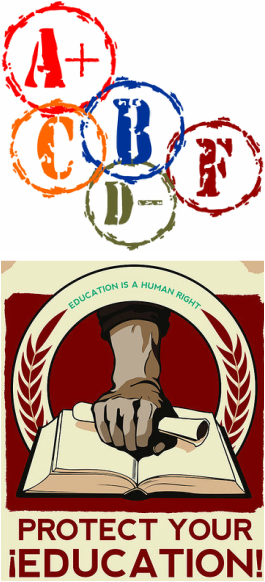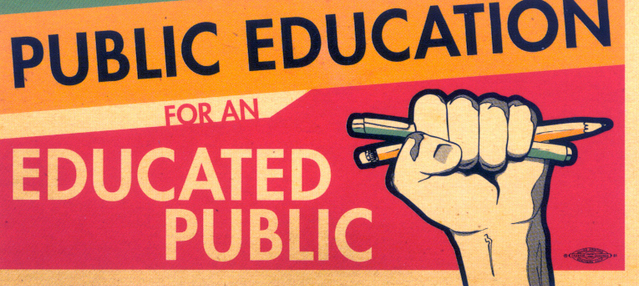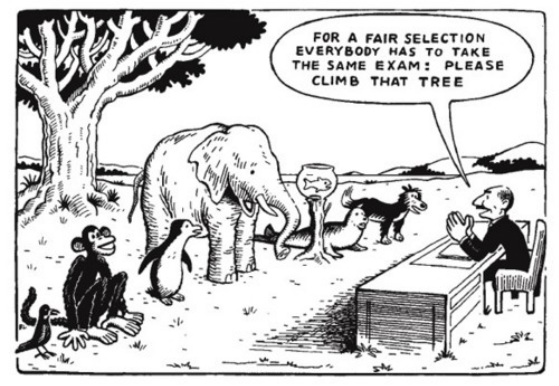The Education Revolution
What's in a grade?

"Grading is one of the most bizarre aspects of teaching. No two teachers grade alike, and everyone thinks their way is best. Does a grade truly reflect what a student has learned... or how hard they tried... or what they’re capable of doing?”
-- Charlie Lindgren
-- Charlie Lindgren
Fair is not always equal!

”In education, we have tended to think of fairness as uniformity. All students have been required to do the same assessments in the same amount of time, and their grades have been calculated in the same way. But students are different in many different ways, and so treating them the same can actually be unfair. Fairness is much more about equity of opportunity than it is about uniformity. For example, some students need to wear glasses when they need them; for fairness we do not say, 'You are doing a test today, but you cannot wear your glasses because everyone is not wearing glasses,’ or 'Some students in this class need glasses, so you will all wear them (whether you need them or not).’”
-- Ken O’Connor
-- Ken O’Connor
The Education Revolution began in 2008...

"What's in a grade?"
I remember being asked this question at a seminar I attended in 2008.
"What makes up a grade in your class?"
Immediately, I thought of points. Grades are made up of points. The more points you get, the better your grade.
"What does that grade reflect?"
Again, my thoughts returned to points. A good grade, like a "B" or an "A", reflects that the student was willing to do her/his projects, homework, extra credit, quizzes, and tests.
"But what part of that grade reflects what the student truly understands?"
And then it hit me. Up until that moment, grades in my class showed that students were able to "play the school game". They knew how to work the points system.
Grades in my class, at that time, reflected whether or not students gathered enough points. Grades were not true reflections of their mastery of the subject material.
It was time for a revolution.
I remember being asked this question at a seminar I attended in 2008.
"What makes up a grade in your class?"
Immediately, I thought of points. Grades are made up of points. The more points you get, the better your grade.
"What does that grade reflect?"
Again, my thoughts returned to points. A good grade, like a "B" or an "A", reflects that the student was willing to do her/his projects, homework, extra credit, quizzes, and tests.
"But what part of that grade reflects what the student truly understands?"
And then it hit me. Up until that moment, grades in my class showed that students were able to "play the school game". They knew how to work the points system.
Grades in my class, at that time, reflected whether or not students gathered enough points. Grades were not true reflections of their mastery of the subject material.
It was time for a revolution.
What does a grade truly reflect?

Is it what a student knew at that particular moment when they took the test, or is it a representation of what they knew from a variety of activities and assessments?
What role do grades play in truly assessing what a student does or does not know?
"From age zero to two, human beings experience their fastest growth spurt. We develop more physically, emotionally, and intellectually during this time than at any other point in our lives. The speed of this development is different from person to person. Knowing this, it would be ridiculous to expect that all kids recite the alphabet in the eighth hour of the fifth day of the tenth month in the second year of their lives (Wormeli, 2006, p. 114)."
What's more important, that 70% of my 150 students grasp the material on November 7th, an arbitrary date picked by me as the day in which every student must prove their mastery of the American Revolution, or that 100% of my 150 students mastered the material at some point during the school year?
Can students recall information they've been taught?
Can they apply what they know to future problems?
Will they remember it when they leave the classroom?
Do they memorize for the test - then forget it all?
"Thus, what or how much material we teach our students matters little. It's what our students learn or what they've mastered that speaks volumes about us as educators (Wormeli, 2006, p. 8)."
And that, comrade, is what prompted The Education Revolution.
What role do grades play in truly assessing what a student does or does not know?
"From age zero to two, human beings experience their fastest growth spurt. We develop more physically, emotionally, and intellectually during this time than at any other point in our lives. The speed of this development is different from person to person. Knowing this, it would be ridiculous to expect that all kids recite the alphabet in the eighth hour of the fifth day of the tenth month in the second year of their lives (Wormeli, 2006, p. 114)."
What's more important, that 70% of my 150 students grasp the material on November 7th, an arbitrary date picked by me as the day in which every student must prove their mastery of the American Revolution, or that 100% of my 150 students mastered the material at some point during the school year?
Can students recall information they've been taught?
Can they apply what they know to future problems?
Will they remember it when they leave the classroom?
Do they memorize for the test - then forget it all?
"Thus, what or how much material we teach our students matters little. It's what our students learn or what they've mastered that speaks volumes about us as educators (Wormeli, 2006, p. 8)."
And that, comrade, is what prompted The Education Revolution.








